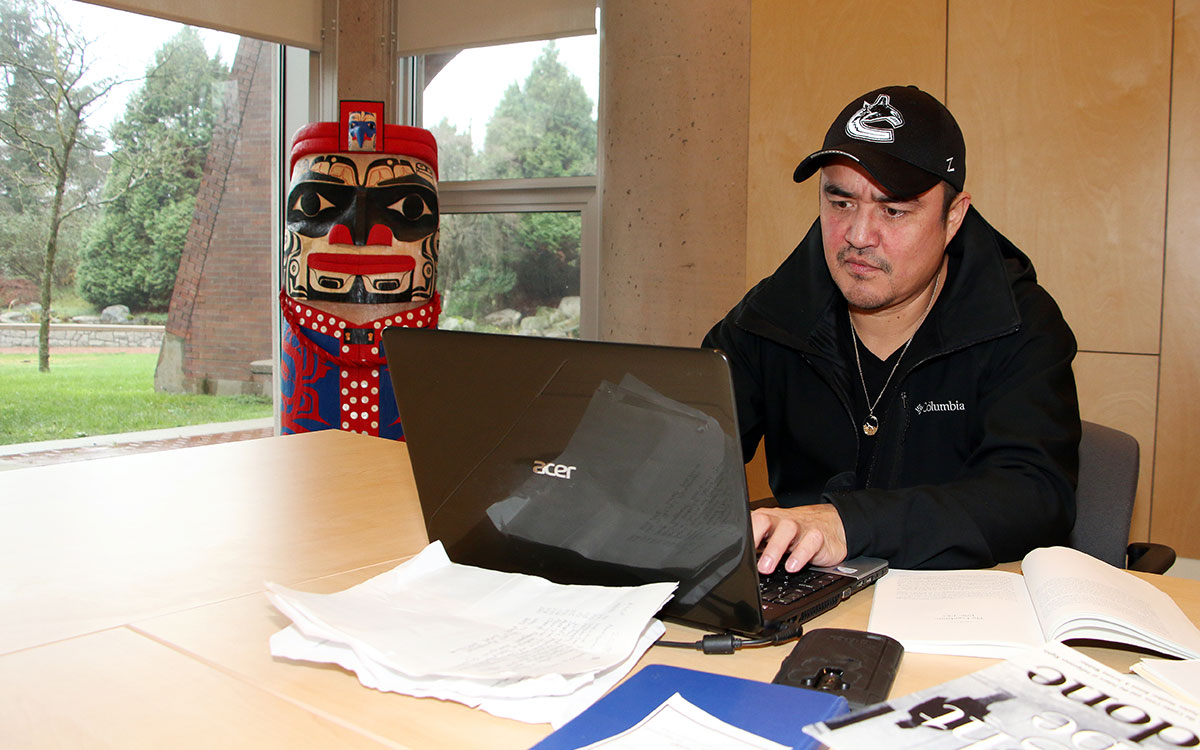Malcolm Stewart has always wanted to further his education. Ironically, it took an injury to give him the opportunity.
Malcolm, 47, hails from the Nisga’a Nation in northwestern BC. He’s spent the past 20 years working in the construction industry as a carpenter, and most recently as a construction safety officer/occupational first aid attendant at local highrise projects.
Restless while on medical Employment Insurance, off work due to an injury, he sought a way to be constructive with his time.
It was on Facebook where he learned of Justice Institute of British Columbia’s (JIBC) Justice and Public Safety Certificate program for Aboriginal learners which started in January 2016. Run in conjunction with Native Education College, it concludes in April 2017.
The program, from tuition to textbooks, is fully funded by government through the BC Ministry of Advanced Education, the Employment Services and Supports (ESS) stream of the Canada-BC Job Fund Agreement, and Indigenous and Northern Affairs Canada. To be eligible, students must identify as being of First Nation, Metis or Inuit heritage and have an interest in justice and public safety careers.
“Going back to school has always been on my mind but financially it was just not viable for me,” Malcolm said.
Then the opportunity for free post-secondary education at JIBC came up and he jumped at it.
If you don't enjoy what you're working at you won't like your job. You find something you're passionate about and you work at it.
Not only has the program given him first responder training and enriched his understanding of First Nations issues, law and the criminal justice system, it opened his eyes to future career possibilities.
Now Malcolm wants to return to JIBC to earn a Law Enforcement Studies Diploma and eventually, a Bachelor of Law Enforcement Studies. It’s a path he hopes will lead to a job as a parole or probation officer for Corrections Canada, working with First Nations parolees.
“I’ve always had a profound interest in working with First Nations people,” said Malcolm. “The courses I was taking kind of made me want to work with First Nations people that are wanting to reintegrate back into society after being released from prisons.”
Malcolm believes his time as a student and ongoing love of learning makes him a role model for his children.
“If you don’t enjoy what you’re working at you won’t like your job. You find something you’re passionate about and you work at it.”
Still, being a student can be stressful at times, particularly as he has a young family at home. He’s thankful that his partner is supportive of his educational pursuits.Malcolm is also mindful of one of his greatest sources of inspiration.
“At one point I almost pulled out. My mother passed away recently in August. But she pulled me aside before she passed on and told me not to quit, not to drop out. That’s why I’m still here. She was a big proponent of getting your education. She drilled it into our heads that it’s important. Into my head anyway.”
He mentions that he’s been hard at work on an essay on his choice of a “justice hero” – Frank Calder, the late former president of the Nisga’a Tribal Council (now known as the Nisga’a Lisims Government) and longtime MLA who led the court fight decades ago that ultimately opened the doors for treaty talks in BC, resulting in the Nisga’a Treaty.
“It helps when you’re excited about an assignment.”
For more on JIBC’s services for Aboriginal learners, visit Aboriginal Student Services.
